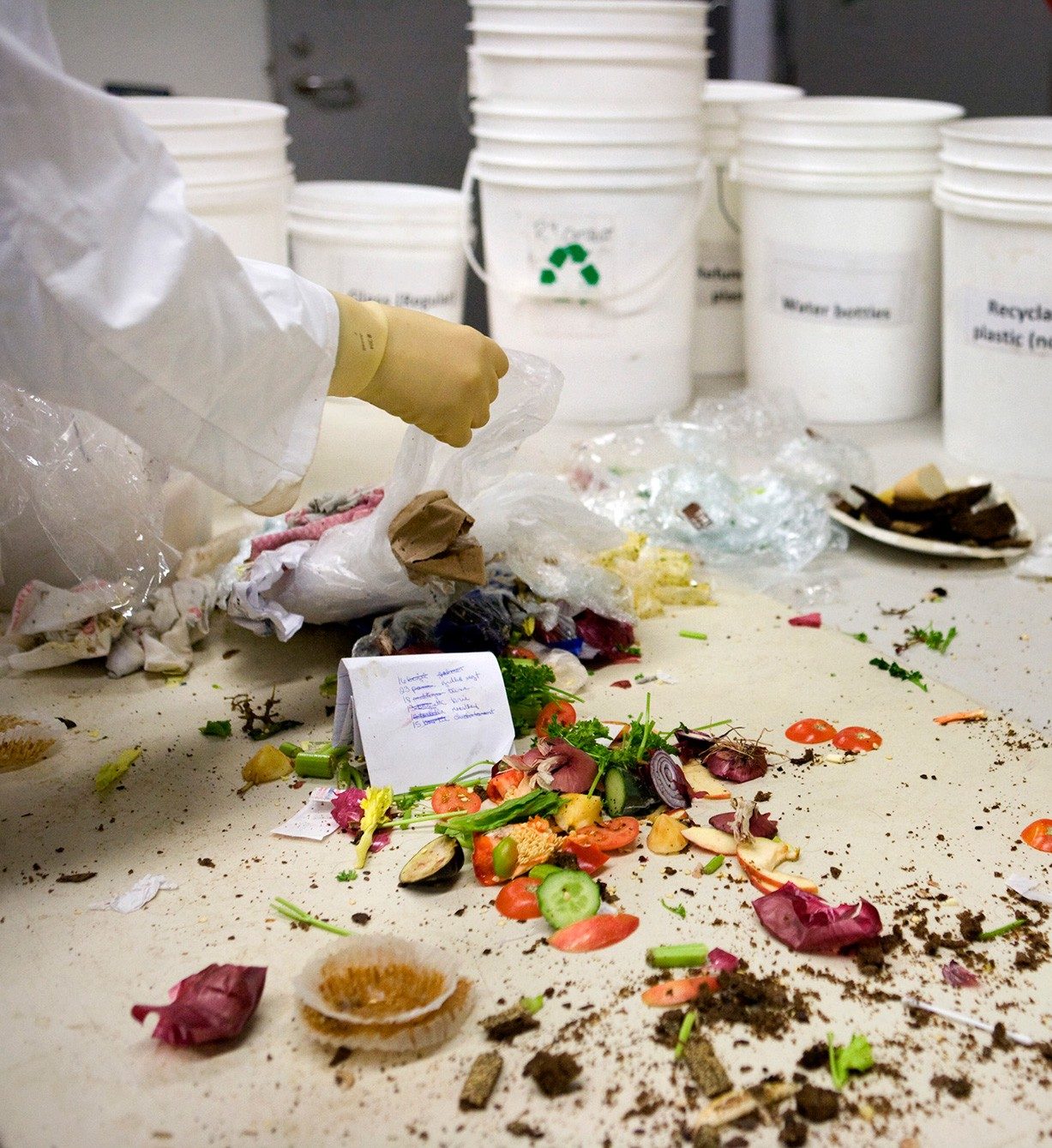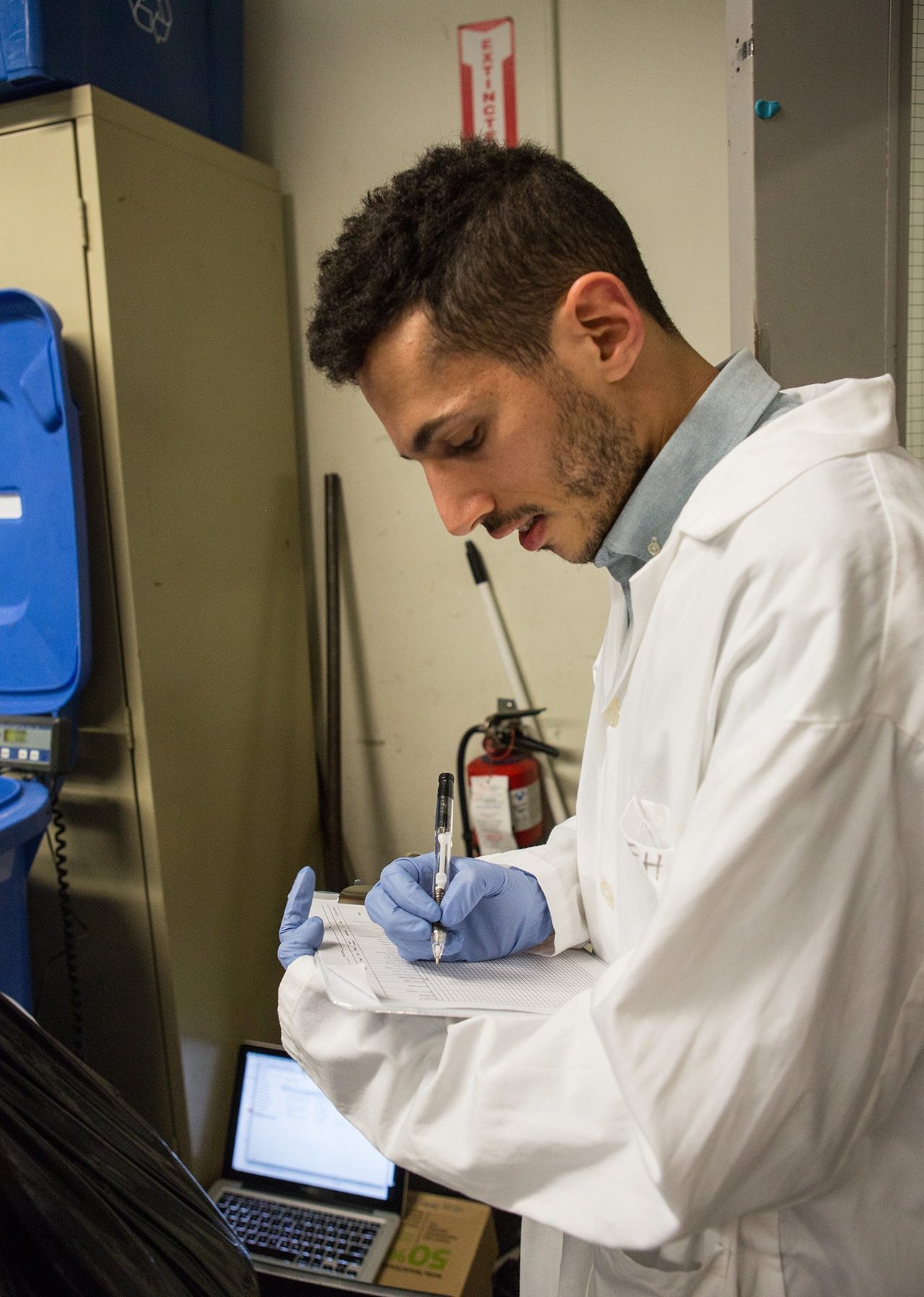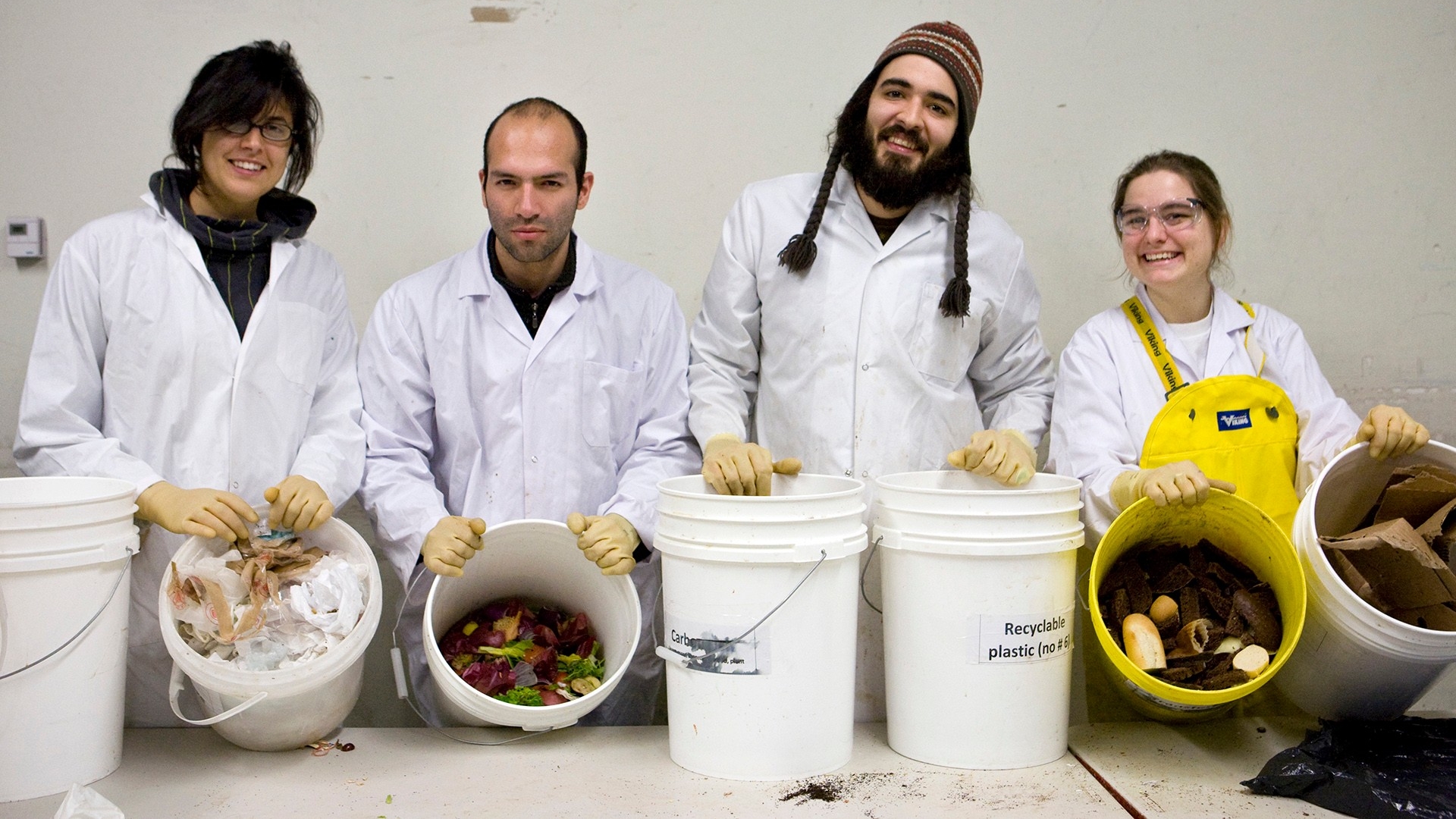Zero Waste Plan
Reducing and diverting waste
Our baseline
The Concordia University Centre for Creative Reuse (CUCCR) was created in 2017 as a depot where community members can browse materials that otherwise would be destined for landfill.
In 2019, CUCCR was expanded and relocated to the Grey Nuns Building with the following objectives:
- Add services: These include furniture upcycling, a tool library and a waste diversion service for students moving out of residence.
- Engage and divert more: To date, the Reuse Centre has engaged 2,735 members, diverted over 18 metric tonnes of waste and saved community members an estimated $172,000.
- Maximize our asset value: Through the Asset Management program of Treasury and Investments, we started the inventory of moveable assets such as furniture and requests for used items, which diverted over 30 metric tonnes of waste in the first year of implementation.

We set up the Low Waste Office initiative:
- This initiative replaces desk-side trash bins with personal self-service bins and provides centralized access to compost to all offices.
- The Low Waste Office initiative is estimated to have increased our waste diversion by 80 per cent in office areas.
- It also reduced our servicing costs and provided key information to office occupants on how to properly sort waste at Concordia.
- Thousands of unnecessary trash bins have been removed and will be sold at a pay-what-you-can rate or donated for reuse purposes.
We got ambitious about composting:
- We moved to a compost-only model at our dining halls on both campuses.
- We reached out to thousands of community members about how and where to compost through our Waste Not Want Not compost collaboration.
- We increased our compost bin numbers from around 15 to over 200.
- Compost collection has more than doubled, from around 45 metric tonnes per year in 2015-16 to over 90 metric tonnes per year in 2018-19.
We created the Zero Waste Challenge:
- Concordia’s first Zero Waste Challenge in 2018 engaged over 100 community members toward a common goal: trying not to produce any non-recyclable or non-compostable waste.
- The Zero Waste Challenge is organized in partnership between Zero Waste Event Services, Sustainable Concordia and the Zero Waste Concordia program.
- Zero Waste Event Services, which provides reusable dishware to any community member for free, has greatly increased the number of items lent out.

Key five-year targets and strategies
Go beyond best practices and further improve our waste reduction and diversion performance as well as foster an innovative curriculum and research-integrated program
- Perform a feasibility study and launch a pilot phase for a waste and materials sorting centre and make the materials available both on and off campus; a sorting centre would be used to separate landfill and recycling waste streams into clean, high-value individual material streams to encourage a circular economy of plastics, composites, fabrics and other materials
- Explore strong financial incentives to reduce and divert waste, and launch pilot program with tenants
Support and expand reuse initiatives as well as create procurement policies and procedures that favour waste reduction
- Encourage zero waste purchasing through sustainable vendor encouragement, take-back programs, equipment loan programs, low or no packaging and sustainable local materials
- Examine major university-wide or department procurements and investigate best practices for waste reduction relating to each
- Provide education sessions to departments on best practices in zero waste procurement and customized recommendations based on their purchasing patterns
- Implement clear procedures for sustainable asset management from the purchasing phase to the disposal phase, and consider ways to facilitate asset sharing
- Explore avenues for offering non-reusable e-waste for parts to the community
- Encourage units, faculties, and student associations and groups to adopt Zero Waste Policies
- Create Property Management level procedures on waste management to align with Zero Waste objectives, LEED O+M, and BOMA Best requirements
- Promote zero waste coffee and beverages by exploring initiatives such as effective bring-your-own-mug incentive structures, container-share programs or bottleless beverage vending machines in order to reduce beverage waste on campus

Bring our performance related to waste reduction and diversion to the same level as top-performing universities, by continuing to implement best practices
- Continue standardization of Low Waste Office configuration (replacement of desk-side trash bins with personal sorting bins, providing access to compost) for all existing and new office spaces, and increase office waste education and engagement initiatives
- Encourage our food service tenants to become zero waste: implement pre- and post-consumer compost and recycling collection, low-waste washing facilities and participation in food donation programs
- Establish metric-based targets with the objective of creating and sustaining “Zero Waste Culture” at Concordia
- Provide training on organizing zero waste events to event coordinators, caterers, event space administrators and custodial staff; provide more compost bins to standardize their availability; promote bottle-free events; encourage groups to exclude non-recyclable and non-compostable packaging while promoting reusable alternatives such as the Zero Waste Event Services
- Provide waste-sorting and food leftover donation assistance; support the Sustainable Event certification
- Identify opportunities to reduce and divert research and teaching laboratory waste
- Promote zero waste renovation and construction; assess the integration of zero waste principles in contracts; provide benefits to contractors who follow these principles and performing strict tracking of waste diversion
Drafting Committee
The committee members below worked between June 2018 and May 2019 to draft the 20-year goals and five-year targets and strategies of the stream plans. Concordia then consulted with key stakeholders to determine the feasibility and impact of their recommendations, which allowed for the prioritization and budgeting of the plans.
Note that titles reflect members’ designated roles at the time of their work on the committee.
Chair: Paul Blouin (Manager,Tech Coord/Prcs Improv - Facilities Management)
Coordinator: Faisal Shennib (Environmental Coordinator – Facilities Management)
Membership:
- Akira De Carlos (Sustainability Coordinator, CSU)Andale Evans (Custodial Supervisor, Facilities Management)
- Anghelos Coulon (Communications & Design Coordinator, Sustainable Concordia)
- Anna Timm-Bottos (Centre for Creative Reuse Coordinator, Facilities Management)
- Arrien Weeks (Centre for Creative Reuse Depot Coordinator, Facilities Management)
- Cameron Stiff (M.Env Candidate, Department of Geography)
- Jane Cui (Nutrition and Sustainability Manager, Aramark)
- Keroles Riad (Individualized program, Gina Cody School of Engineering and Computer Science)
- Marc Champagne (Manager, Custodial Services, Facilities Management)
- Mark Underwood (CEO, Sustainability Action Fund)
- Maya Provencal (Outreach Coordinator, Dish Project)
- Sherif Goubran (PhD Candidate, INDI Program, Graduate Students Association)
- Stephanie Bradley (Architectural Technician, Project Management, Facilities Management)

